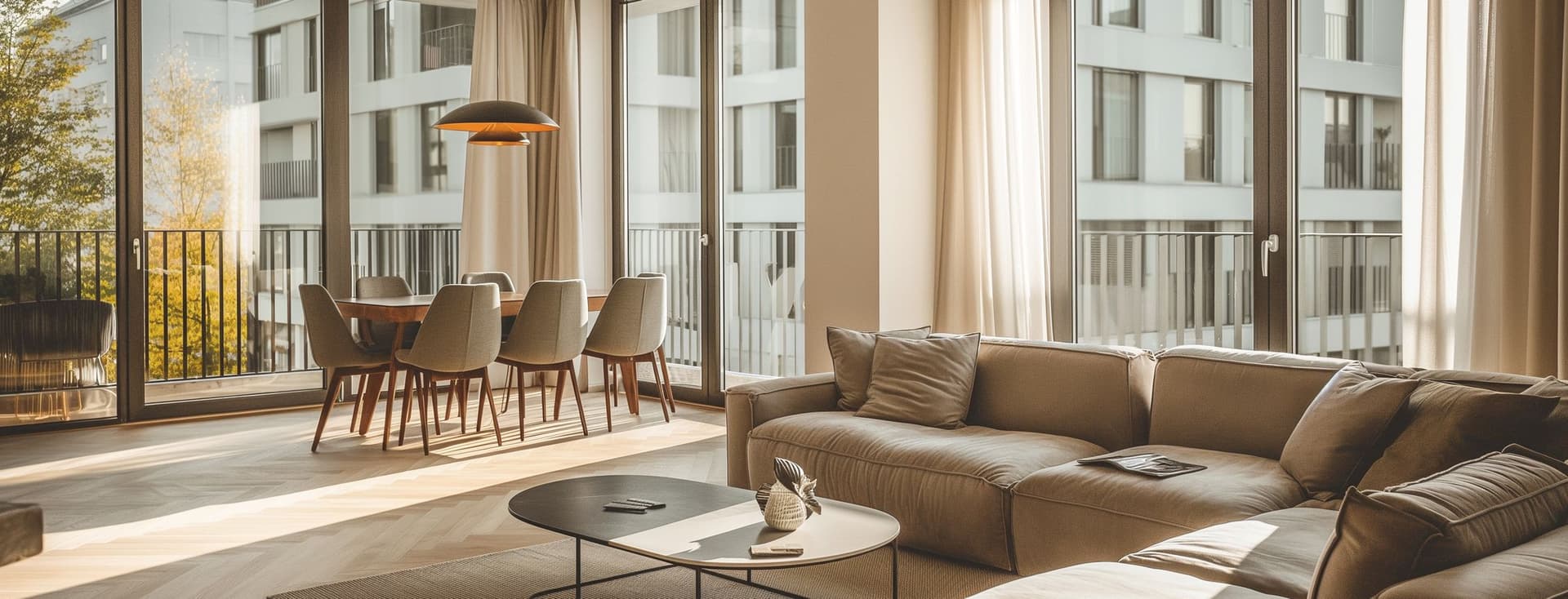- 3 min read
Condominium ownership explained in brief

Your own four walls at last! Would you like to buy an apartment or have you already bought your own apartment? We explain the principles of condominium ownership and show you what you should pay particular attention to as a buyer or owner.
What is condominium ownership?
Condominium ownership was officially introduced in Switzerland in 1965. The primary aim was to enable a larger proportion of the population to acquire property. The increase in home ownership in Switzerland to currently around 40 percent can be attributed in part to the introduction of condominium ownership.
In legal terms, condominium ownership is a form of co-ownership that is inseparably linked to a special right. This means that the condominium owner has co-ownership of the entire property and has exclusive use of specific parts of the building through the special right. In other words, the owner has the exclusive right of use for his apartment and the associated rooms (e.g. cellar). A detailed allocation of the individual areas can be found in the floor division plans, which are filed with the land registry.
All parts that are not allocated to the special right are called common parts. The common parts are regulated in Art. 712b ZGB and include, among other things
Land: e.g. garden and outdoor parking spaces
Elementary parts of the building: e.g. foundations and load-bearing walls
Parts of the building that determine the appearance of the entire building: e.g. windows and facade
Common facilities and installations: e.g.staircase and central heating
While buyers focus primarily on the financing, other important documents are sometimes overlooked. However, it is worthwhile for both buyers and owners to take a close look at the other aspects of condominium ownership.
- New
- New
- New
- New
- New
Neighborhood with potential for conflict
Whether owner or tenant, a friendly and pleasant atmosphere between neighbors is desirable in any case. As a condominium owner, however, you are particularly dependent on a good relationship. On the one hand, condominium owners live closer to each other than is the case with single-family homes and, on the other hand, unlike tenants, they are tied to the apartment in the medium to long term.
An additional aspect only becomes apparent on closer inspection. Condominium owners are dependent on the favor of their neighbors when it comes to decisions about the common parts of the property and, in some cases, for renovations to their own apartment. For example, you cannot simply replace the windows in your apartment without the approval of the condominium owners' meeting. Decisions that affect the external appearance of the property must always be approved by the condominium owners' meeting. That's why it pays to maintain good neighborly relations. In line with the principle of "live together" rather than just "let live".
Rules for living together
The law does not make it compulsory to draw up regulations. However, drawing up such regulations makes it easier for condominium owners to live together by clearly specifying important provisions. In particular, the majority of the owners' meeting should be regulated in the condominium owners' regulations. Other rights and obligations in connection with the common parts such as the garden or the stairwell can also be part of the regulations. Detailed regulations also contain provisions on commercial use, keeping pets and much more. It is therefore worth studying the regulations carefully. Owners should be familiar with the key provisions and have the current regulations to hand in case of doubt.

Successful selling - with Engel & Völkers
Promising: Our worldwide network of pre-registered potential buyers
The cost of renewal funds
Many condominium owners are unaware that the common parts account for around two thirds of the total value of the property. As a condominium owner, you are not only responsible for the upkeep of your own apartment, but as a community also for the upkeep and maintenance of the entire property. For this to be possible at all, the establishment of a renewal fund is prescribed by law. However, the law does not specify the amount of the contributions. Studies have shown that the renewal fund is often not sufficient to carry out the necessary renovation measures. Unfortunately for condominium owners, the long-term maintenance and renovation work is usually associated with considerable costs. If the renewal fund is not sufficient to cover the necessary maintenance and repair work, the condominium owners bear the additional costs.
Whether you are a buyer or an owner, find out about the status of the renovation fund and obtain information about upcoming measures over the next 10-15 years. The list shows you the current status and enables you to identify bottlenecks at an early stage.
Do you have any questions about condominium ownership or would you like specialist support? Then don't hesitate to contact our Store in your area in your area.
Addendum:
The legal basis for condominium ownership can be found in the Swiss Civil Code (ZGB):
Art. 60 ff. on association law
Art. 646 ff. on co-ownership
Art. 712a ff. on condominium ownership
You may also be interested in
Contact
Contact your personal advisor


Engel & Völkers Switzerland
Poststrasse 26
6300 Zug | Switzerland
Tel: +41 41 500 06 06